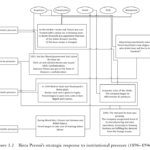Not much inclined to write for the last week or so. Late 1970s nuclear fear retro followed quickly by 1930s Nazi fear retro. Seems our neighbours to the south hired a moron and he is turning out to be a fabulous moron attracting other morons to flit about his flame. Like last summer, one barely knows what to reach for but, perhaps unlike last summer, one knows one might need to. What to do in these troubled times? Perhaps explore how fascism, communism and racism (perhaps bundled as “totalitarian supremacism“?) has been known to brewing over time? Let’s see.
Earlier this year, Hungary witnessed a bit of a political controversy over the appearance of Heineken’s red star – which Hungarian law considers a totalitarian symbol. As might have been expected, it was apparently as much as anything about contemporary politics and the time-honoured role brewing money plays in that game.
Totes Supps can also show up in more unexpected ways. In 2016, a brewery in Bavaria was accused of offering a Nazi friendly lager named Grenzzaun Halbe, or Border Fence Half. Priced at 88 euro cents a bottle, it was considered code for HH or Heil Hitler. The brewer in the usual way explained “insisted the name and slogan were not directed against migrants, but referred to defending Bavarian culture“* but, oddly, also said they had lent resources to the refugee influx.
Then there are the old boys who, you know, just say those sorts of things. Yesterday, Jason Notte provided a bit of a walk down memory lane offering the legacy of US brewing mogul Bill Coors who was apparently quoted in 1984 for providing such comments as “…one of the best things they did for you is to drag your ancestors over here in chains…” and “…they lack the intellectual capacity to succeed, and it’s taking them down the tubes” though the resulting libel suit against a newspaper that had the gall to report his words was dropped. The old git is still with us apparently, turning 101 the other day. Other similar substantial claims were made against the brewery in those days. Interesting, then, that three years later this was an opinion reported by the Syracuse Herald-Journal of February 10, 1987 just when Coors was entering the CNY market:
“When you buy their product you are, in effect, inviting the Coors people into your home,” said Joseph Welch, executive secretary of the Greater Syracuse Labor Council. “I think anyone with a conscience wouldn’t want those kind of people in their homes.”**
 But these brewers can also be ingrained into the movement. If we go back a bit further, one can look at what brewers did during the time when fascists were actually in the ascent. To the right is a very handy graph with the somewhat vague title “Birra Peroni’s strategic response to institutional pressure” from the 2016 book Accounting and Food: Some Italian Experiences by Sargiacomo, D’Amico and Di Pietra. I say vague given it illustrates, in part, this business decision from 1926 to the regime’s fall:
But these brewers can also be ingrained into the movement. If we go back a bit further, one can look at what brewers did during the time when fascists were actually in the ascent. To the right is a very handy graph with the somewhat vague title “Birra Peroni’s strategic response to institutional pressure” from the 2016 book Accounting and Food: Some Italian Experiences by Sargiacomo, D’Amico and Di Pietra. I say vague given it illustrates, in part, this business decision from 1926 to the regime’s fall:
…the Fascist government tried to control production and balance demand and supply by controlling the supply side…. In this context, the company’s strategic response may be viewed as a compromise. Giacomo Peroni, former president of the earlier Unione Italiana Fabbricanti di Birra (Italian Brewers’ Union) was put at the helm of the new association. As the managers of the new association, Giacomo could act as an institutional entrepreneur and therefore bend the institutional change to his own and his company’s interests. In fact, despite the need to reduce the company’s production volume as imposed by the Fascist government, in his role Giacomo Peroni managed to avoid such cuts and toss them off on his competitors. This is suggested by the fact that it was precisely in those years that the company increased its production volume and sales.
Suggested?*** Hmm… Apparently, Peroni also fed demand from what are described as the “new African colonies” aka the invasion of Ethiopia. Nothing like a captive audience. Note: Peroni continues as a brand now owned by Japanese brewer Asahi, achieving apparently some recent success.
And we do also recall that the 1923 Beer Hall Putsch did lead to the army being called out, an arrest, a trial and a five year term. Well, then someone gave Hitler a pen in jail and he wrote down his evil which was shared after an early release.
What does all this prove? Well, as you can see in the footnotes, we can laugh at it. We can also support the democratic processes that stand against it. But that totalitarian supremacist is going to keep popping up. No point in pretending, offering a beer and dreaming that people are good. Some people are very bad. Having lived though an number of genocides at the youthful age of 54 – from Cambodia to the Balkans – I don’t expect that evil to change. But if we understand that it is an insidiously corrosive, inveigling tendency we should be aware that it needs being watched out for and given proper response.
*See here for more.
**See here for more.
***See here for more.
